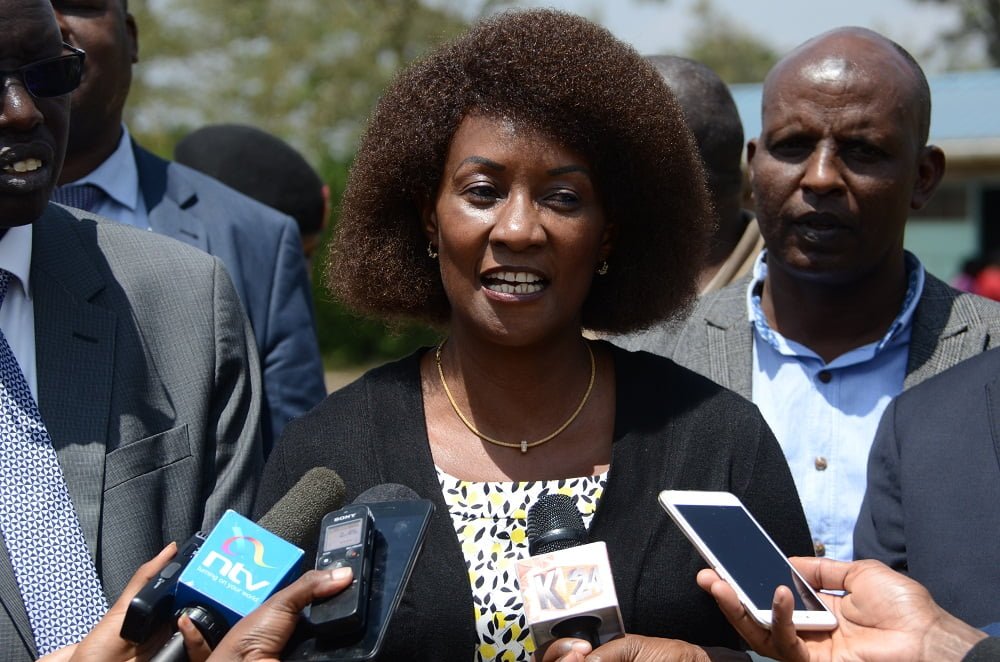By Fredrick Odiero
The Teachers Service Commission (TSC) has given instructions to universities and other institutions of higher learning on what is required of them based on the Competence Based curriculum.
TSC Chief Executive Officer Dr. Nancy Macharia said the move has been necessitated by the need for such institutions of higher learning to know what is required of them as they admitted students.
Addressing members of national secondary schools heads forum at a Kisumu Hotel Macharia said CBC requires a lot of innovation from teachers, learners and even parents.
She said CBC is an accepted model both regionally and internationally.
Macharia added that universities and other institutions of higher learning should be equipped with what is required of them based on the CBC.
The move, she said, has been necessitated by the need for such institutions of higher learning to know what is needed of them as they admitted students.
Macharia said CBC is an accepted model both regionally and internationally.
She urged teachers to take the Teacher Professional Development (TPD) seriously since it enhances their professional capacity and added that the mode is now the way to go since it improves the capacity of teachers.
She divulged that even the African union has embraced the module adding that it is now a requirement there.
The CEO said teachers must adapt to digital technology in the wake of the changing trends as demonstrated with the onset of the Covid-19 pandemic where people had to work digitally from home.
Dr. Macharia urged teachers to continuously engage learners and parents in order to avoid incidents of unrest.
She lauded the over 300,000 teachers across the country for the hard work exhibited despite turbulent times.
The CEO assured that teachers who deserve to be promoted will be considered since the body is mindful of their welfare.
Dr. Macharia also advocated for continuous guiding and counseling in schools.
She advised schools to embrace remote learning methodologies to overcome the disruptions of Covid-19.
Macharia said teachers need to be tech-savvy not only to access online educational resources and diversify modes of curriculum delivery, but also to access a whole range of automated services offered by the commission.
The CEO said the integration of information and communication technology in teaching and learning can help improve teachers’ content delivery and classroom engagement.
She noted that the sustainable development agenda for 2030 demands that every person acquires 21st century skills, including digital literacy.
In undertaking their duties, Macharia said teachers are guided by legal provisions, regulations and policies in the education sector.
However, she said some teachers do not adhere to the laid out regulations leading to cases of misconduct.
“The onus is on you as well-grounded administrators (Principals and Head Teachers) to guide teachers through the profession by being role models,” Macharia said.
The CEO recommended that teachers embrace mentorship and coaching approaches to equip them with requisite knowledge on expectations, norms and standards of teaching.
She said available research shows that unlike the previous generation of students, very few 21st century learners neither know why they are in school nor why they should take schoolwork seriously.
“Most of the learners see learning as their parents’ desire that is imposed on them,” Macharia said.
Macharia urged chief principals to bring innovations and ingenuity in management of student discipline especially as they enter exams period.
She noted that there are dimensions of examination malpractices year-in-year-out as students come up with new tricks of examination malpractices.
Macharia said at times the centre managers, supervisors and invigilators are found culpable of the malpractice.
“As you prepare to enter the final term during which KCSE will be conducted I wish to remind all teachers to prepare the candidates well and desist from the temptation of engaging in any exam malpractice,” she said.
Macharia commended all teachers for their efforts in running the schools calendar and preparing candidates under very harsh circumstances.
She said with the change in curriculum, the role of the teachers has changed fundamentally because it ought to be guided towards the needs of the learners and the curriculum.
“For teachers to meet the needs of the 21st century learners they should possess additional skills that include a learner-centred classroom, students as learners, users, and producers of digital content and project based learning,” Macharia said.
She added that these are skills that CBC is demanding of teachers and therefore they must enhance their instructional skills and content knowledge.
By April 2022, she said the commission will be training secondary school teachers on CBC and urged them to familiarise with the CBC since the first cohort will join junior secondary in 2023.
Macharia said the commission had envisaged that the performance gaps identified through teachers performance appraisal and development (TPAD) and Performance contract would be addressed through teachers’ professional development (TPD) programmes.
In addition, she said TPD would improve the professional standards of Kenya teachers as well as keeping them abreast with the emerging trends in the education sector.
However, Macharia decried that the executions of these programmes have been faced with litigation thereby delaying their implementation.
“At times one is left to wonder how else the commission would have undertaken its functions, if even when all procedures and legal requirements have been followed, issues end up in courts,” she said.






